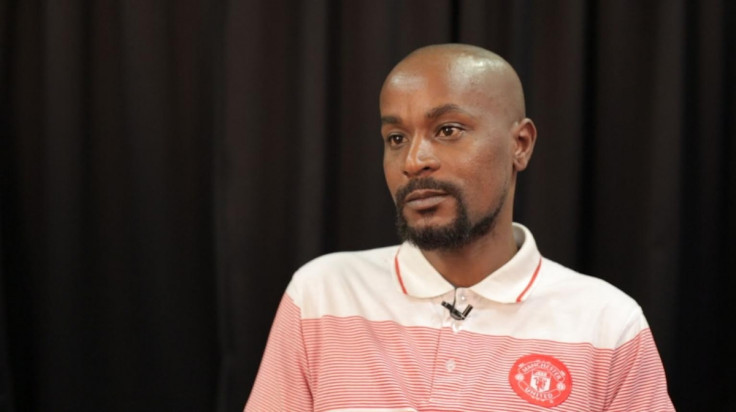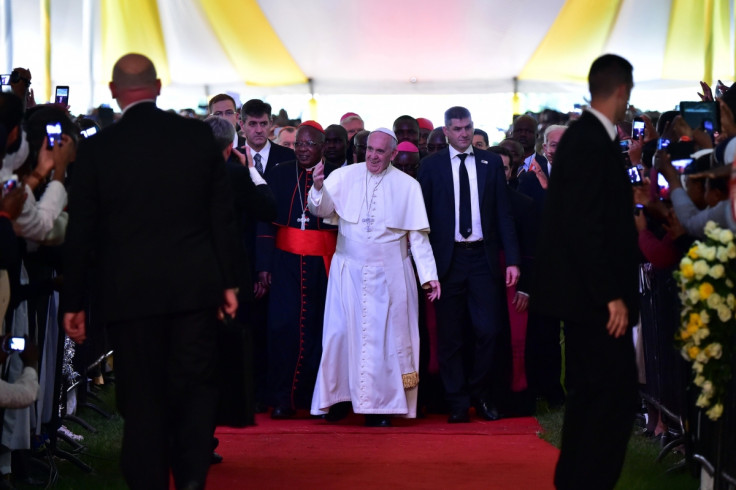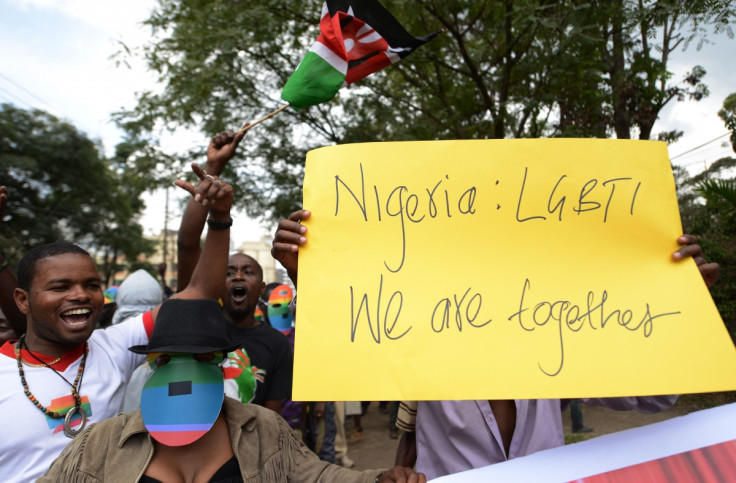Kenyan LGBT activist Eric Gitari: 'My parents were told to explain why their son did evil work'

Eric Gitari has been harassed, threatened with violence and has even had his phone tapped by the Kenyan National Intelligence Service. "I once went to a barber shop to get a shave and because I'm out as gay and I'm an activist on television, I was denied service because the clients were afraid of being associated with a homosexual."
As the director of the National Gay and Lesbian Human Rights Commission, Gitari is one of the leading LGBT rights activists in Kenya, one of 36 African countries that have criminalised homosexuality. Discrimination and stigma, while disparaged by the Kenya's political leaders, is still widespread – but human rights groups hope Pope Francis' inaugural visit to the continent will encourage tolerance.
"The Pope's visit will help greatly because he carries a lot of moral authority," Gitari says in an interview with IBTimes UK. "He has a huge Catholic following in Africa. The Pope has a chance to speak to people's hearts because of his position as a spiritual leader."
He has spoken of peace and reconciliation, but human rights activists hope the Pope will take a strong position on the protection of LGBT Kenyans and other minorities. His visit will take him through war-torn Central African Republic and Uganda, which have both criminalised homosexuality. The latter is tightening laws and passed the notorious Anti-Homosexuality Bill in 2013, which not only lengthened sentences for consensual homosexual sex, but extended punishments to those "promoting" homosexuality.
If he addresses the topic, Pope Francis will have to navigate carefully as he will pit the relatively liberal message on acceptance against Africa's highly conservative church leaders.
"He will be bringing the message home and curing the disconnect that we see, where the Pope is speaking of tolerance from the Vatican, but, our bishops in Kenya have been speaking the opposite language of intolerance and exclusion," Gitari says.
"I know my mum, who is Catholic, would listen to the Pope. I know that my father, who is a leader in the Catholic parish, would listen," he says. "My parents have both been summoned by a local parish to go and explain why their son is doing evil work with LGBT equality."

Changing attitudes
Attitudes against homosexuality prevail across the African continent. A 2013 survey by the Pew Research Center revealed 90% of Kenyans were against homosexuality. In sub-Saharan Africa, fewer than one in 10 said homosexuality should be accepted by society: 4% in Uganda, 3% in Ghana and 1% in Nigeria. South Africa is the only African country to have legalised gay marriage.
In May, Gitari's photo was featured with nine others on the front page of a Kenyan newspaper with the headline: "Top gays". Some of those named had already come out as homosexual, but others had not, sparking fears their naming would incite further hatred or violence. The phenomenon has been seen before – in 2010, Ugandan activist David Kato was killed after being "named and shamed" on the front page of a paper, which featured his pictures beneath a banner urging: "Hang Them".
There are signs of progress in eliminating stigma, violence and exclusion in Kenya, however. Last week, a proposed anti-homosexuality bill was thrown out for the second time in two years. "It was a political victory," Gitari says. "Among other things, the bill sought to punish homosexuals by death through stoning – it was basically a copy and paste of the Ugandan law."
In April, the high court ruled that the Kenyan government could no longer block LGBT groups from formally registering their organisations. Since 2012, the National Gay and Lesbian Human Rights Commission had had its application to register as an NGO rejected four times, on the basis that Kenya's penal code criminalises gay and lesbian associations – leaving the group without a number of legal protections.
The groundbreaking ruling found the refusals were an infringement on the constitutional rights of association for the LGBT community, arguing popular morality and religion should not be basis for limiting rights. It might be a small victory, but it is a victory nonetheless. Allowing LGBT groups to register as NGOs provides a platform for activists like Gitari to bring LGBT rights into the public sphere.

Persecution
Homosexuality – or more specifically, same-sex acts – are punishable with a prison sentence of up to 14 years in Kenya. But of the 595 cases of gay people prosecuted in the country between 2010 and 2014, only one person was convicted.
"It is almost impossible to prove the offence has been committed, unless you force people to either confess or undergo anal testing against their will," Gitari says. "So the purpose of the law is not essentially to prosecute people but to persecute."
Every one of the 595 people arrested has been through a publicly humiliating judicial process without enough evidence to prove the charge or the crime they are being accused of committing, he says. "These people have been deprived of their liberty, and shamed in front of family, friends and peers."
One case being dealt with by the National Gay and Lesbian Human Rights Commission is particularly telling of the impact of arrests – even if they do not end in a conviction.
"Earlier this year, two men were picked up in a restaurant and taken to a police station. They were told they were suspected of being homosexuals. But being homosexual is not the crime, the crime is taking part in homosexual sex."
After being detained for four days, the two men were taken to court where they were ordered to have a medical examination. They were taken to a hospital to have their blood tested for hepatitis B and HIV. "It shows the pathological view that homosexuals are diseased," Gitari says.
The two men were then told to remove their clothes and lie on their backs as if giving birth, with their legs in the air.
"They were told to cough and as they coughed, doctors inserted instruments into their rectums to see if there had been any penetration. They were later taken to court and charged with sodomy. The magistrate asked them in court: 'You two men, why would you go seducing each other? You can't even see beautiful women like me?' It is very telling of the situation," Gitari says.
Several months on, the men have been shunned by their families and friends and forced to leave their neighbourhoods, as stories about them have been circulated by the press. One was stabbed in an attack carried out by a group of youths. Both have experienced extensive and ongoing trauma, physically and emotionally.
Even though the harassment and abuse Gitari and other members of the LGBT community in Kenya face is indescribably difficult, he says the hardship has made him who he is today. "Even though it hurt me, it also made me stronger. I swore to myself I would not let anyone break me because of my orientation. My sexual orientation is 5% or less of who I am as a human being."
© Copyright IBTimes 2025. All rights reserved.




















